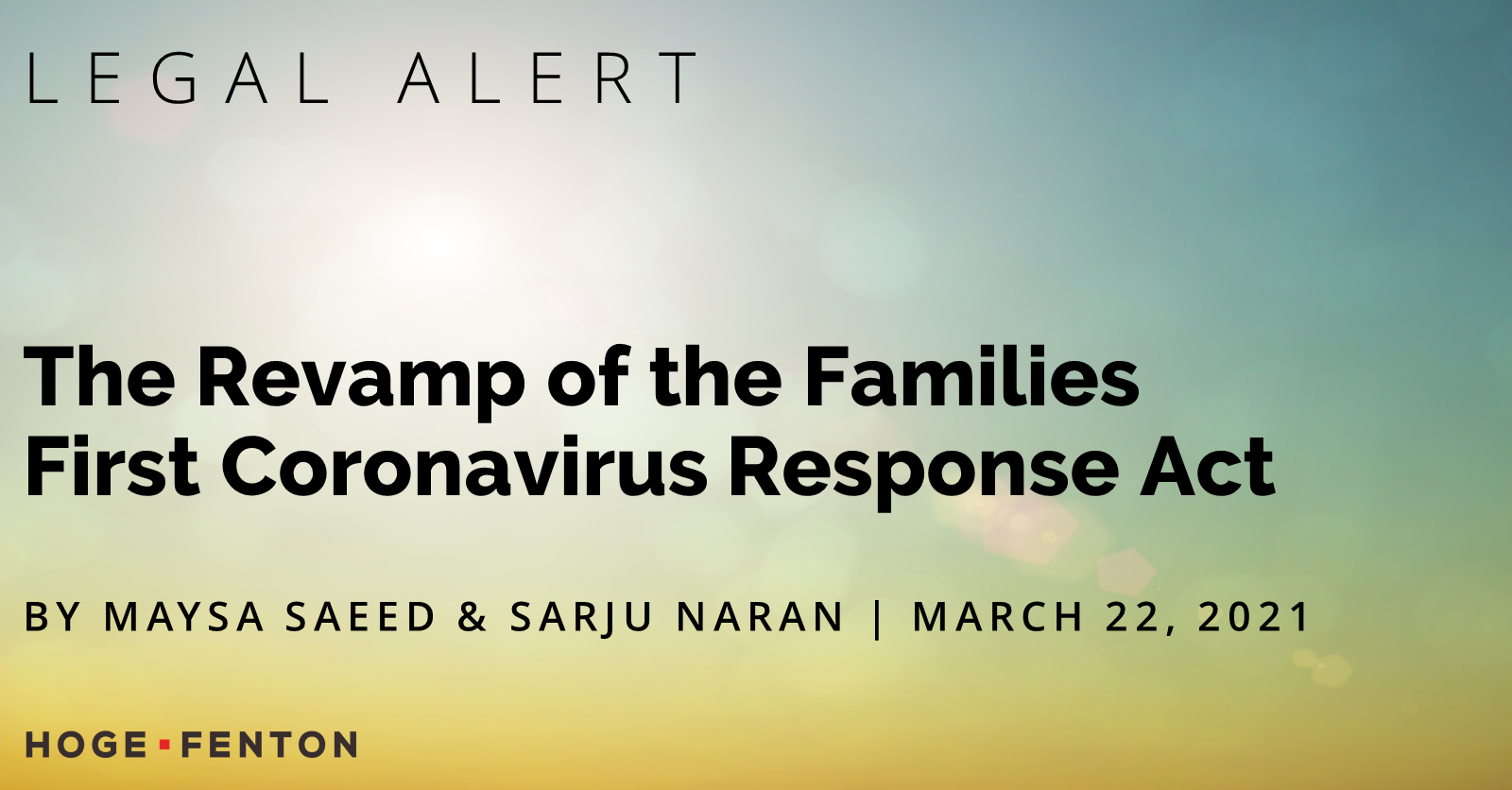The Revamp of the Families First Coronavirus Response Act
By Hoge Fenton | 03.22.2021 | Employment Law

On Thursday, March 11, 2021, President Joe Biden signed into law the most recent COVID-19 relief package, the American Rescue Plan Act of 2021 (“ARPA”). The ARPA affords employer-provided benefits to employees and extends and modifies several of the provisions enacted in prior COVID-19 relief bills, including the Families First Coronavirus Response Act (“FFCRA”).
Background
Last year, the FFCRA required covered employers with 500 or fewer employees to provide eligible employees with paid sick leave and expanded family and medical leave for specified reasons related to COVID-19. That requirement expired on December 31, 2020, and was replaced by the 2021 Consolidated Appropriations Act (“CAA”), which permitted covered employers to continue receiving federal tax credits for allowing its employees to take unused FFCRA paid leave between January 1, 2021 through March 31, 2021.
How Has FFCRA Leave Changed?
Effective April 1, 2021, the ARPA extends the option for employers to voluntarily offer FFCRA paid leave to eligible employees through September 30, 2021, and to receive reimbursement for the pay through tax credits. The ARPA also modifies the FFCRA in a few ways.
New qualifying reasons: As of April 1, 2021, employers who choose to offer FFCRA leave, will need to permit employees to take paid leave for the following additional qualifying reasons: (1) receiving a COVID-19 vaccine; (2) recovering from any injury, disability, illness, or condition related to the COVID-19 vaccine; (3) seeking or awaiting the results of a COVID-19 test when the employee has been exposed to COVID-19 or the employer has requested the test. These new qualifying reasons will apply to both emergency paid sick leave (EPSL) and emergency family and medical leave (EFMLA). Under the original version of the FFCRA, EFMLA was only available for school or childcare issues.
New bank of EPSL time: For employees who previously used some or all of their FFCRA paid sick time, on April 1, 2021, the ARPA creates a new allotment of up to 80 hours (10 days) for qualifying EPSL). Please note, this new allotment only applies to EPSL. Employees who have used some or all of their EFMLA time prior to April 1, 2021 will not be afforded any additional allotment of EFMLA time.
All 12 weeks of EFMLA will be paid: The first two weeks of the 12-week period of leave under the EFMLA will no longer be unpaid. As a result, between EPSL and EFMLA, eligible employees may be able to take up to 14 weeks of paid time off for a qualifying reason, if their employer chooses to offer FFCRA leave (and assuming the employees have not previously exhausted their 12 weeks of EFMLA). Further, the prior cap on pay for EFMLA will increase from $10,000 to $12,000 (to account for the extra two weeks of pay). As before, employees will still be compensated at 2/3 of their regular rate of pay, up to a $200 daily cap for EFMLA.
No discrimination: The ARPA includes rules that will deny employers tax credits if they discriminate by offering leave: (1) in favor of highly compensated employees; (2) in favor of full-time employees; or (3) on the basis of employment tenure.
Beyond the FFCRA
As a reminder, while covered employers are no longer required to provide paid leave under the FFCRA, they should remain mindful of other paid and unpaid leave requirements under state, federal, and local laws.
For more information or resources regarding the FFCRA or other COVID-related laws applicable to employers and/or employees, please refer to Hoge Fenton’s Employment Law Group’s resource page (here), or feel free to contact a member of the Employment Law Group.
Meet Our Employment Law Group
 |
Maysa Saeed is an associate attorney whose practice focuses on employment counseling and litigation and assists clients in all aspects of employment law. Prior to joining Hoge Fenton, Maysa was a litigation associate with experience litigating various commercial, employment, and real estate matters. Maysa’s prior legal experience also includes defending insurance carriers in administrative trials before the Workers’ Compensation Appeals Boards in San Jose and Salinas. |
 |
Sarju Naran is a zealous advocate for his clients and approaches litigation with creativity and strategy. Chair of Hoge Fenton’s Employment Law Group, Sarju’s experience spans from representing middle-market and family-owned closely held businesses to large multi-national companies. He regularly litigates and provides advice and counsel to companies on wage and hour issues, trade secret misappropriation, employee mobility, wrongful termination, performance management, and leaves of absence. |
 |
Jenn Protas helps employers navigate California’s numerous employment laws and defends employers with an eye toward successful, yet cost-effective resolution. Jenn is a committed advocate for her clients and a tenacious litigator. She defends employers on matters related to wage and hour law, wrongful termination, harassment, discrimination, and retaliation in single-plaintiff litigation, Private Attorney General Act actions, and/or class actions. Jenn’s practice also includes housing discrimination matters and business litigation. |
This information is provided as an educational service by Hoge Fenton for clients and friends of the firm. This communique is an overview only, and should not be construed as legal advice or advice to take any specific action. Please be sure to consult a knowledgeable professional with assistance with your particular legal issue. © 2021 Hoge Fenton










